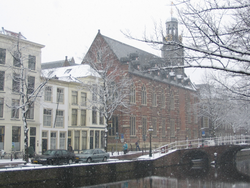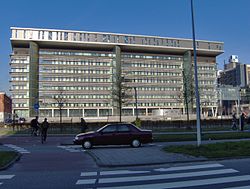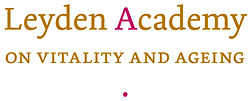- Leiden University
-
Leiden University Universiteit Leiden 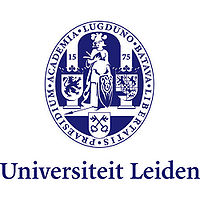
Latin: Academia Lugduno Batava Motto Praesidium Libertatis Motto in English Bastion of Freedom Established 1575 Type Public Rector Paul van der Heijden Academic staff 3,973 Students 18,026 Location Leiden, Netherlands Website www.leiden.edu Leiden University (Dutch: Universiteit Leiden), located in the city of Leiden, is the oldest university in the Netherlands.[1] The university was founded in 1575 by William, Prince of Orange, leader of the Dutch Revolt in the Eighty Years' War. The royal Dutch House of Orange-Nassau and Leiden University still have a close relationship. The Queens Juliana and Beatrix and crown-prince Willem-Alexander studied at Leiden University. In 2005 Queen Beatrix received a rare honorary degree from Leiden University.[2]
Leiden University has six faculties, over 50 departments and more than 150 undergraduate programmes and enjoys an outstanding international reputation. Shanghai Jiao Tong University's 2010 Academic Ranking of World Universities ranks Leiden University as the 70th best university worldwide.[3] The 2009 THE-QS World University Rankings ranked Leiden University 60th in the world overall.[4][5] In 2011 QS World University Rankings[6] has ranked Leiden University as 88th overall, and the 37th best university worldwide for Arts and Humanities. THE 2010 World University Rankings has ranked Leiden University as the best university in Continental Europe for Arts and Humanities. The university is a member of the distinguished Coimbra Group, the Europaeum and the League of European Research Universities.
Leiden University houses more than 40 national and international research institutes.
Contents
History
In 1575, the emerging Dutch Republic did not have any universities in its northern heartland. The only other university in the Netherlands was in southern Leuven, firmly under Spanish control. The scientific renaissance had begun to highlight the importance of academic study, so Prince William founded the first Dutch university in Leiden, to give the Northern Netherlands an institution that could educate its citizens for religious purposes, but also to give the country and its government educated men in other fields.[7] It is said the choice fell on Leiden as a reward for the heroic defence of Leiden against Spanish attacks in the previous year. Ironically, the name of Philip II of Spain, William's adversary, appears on the official foundation certificate, as he was still the de jure count of Holland. Philps II replied by forbidding any subject to study in Leiden. Originally located in the convent of St Barbara, the university moved to the Faliede Bagijn Church in 1577 (now the location of the University museum) and in 1581 to the convent of the White Nuns, a site which it still occupies, though the original building was destroyed by fire in 1616.[7]
The presence within half a century of the date of its foundation of such scholars as Justus Lipsius, Joseph Scaliger, Franciscus Gomarus, Hugo Grotius, Jacobus Arminius, Daniel Heinsius and Gerhard Johann Vossius, raised Leiden university to be a respected and highly thought of institute within Europe. Renowned philosopher Baruch Spinoza was based close to Leiden during this period and interacted with numerous scholars at the university. The learning and reputation of Jacobus Gronovius, Herman Boerhaave, Tiberius Hemsterhuis and David Ruhnken, among others, enabled Leiden to maintain it's reputation for excellence down to the end of the 18th century.
At the end of the nineteenth century, Leiden University again became one of Europe's leading universities.[8] At the world’s first university low-temperature laboratory, professor Heike Kamerlingh Onnes achieved temperatures of only one degree above absolute zero of -273 degrees Celsius. In 1908 he was also the first to succeed in liquifying helium and can be credited with the discovery of the superconductivity in metals.
Kamerlingh Onnes was awarded the Nobel Prize for Physics in 1913. Three other professors received the Nobel Prize for their research performed at Universiteit Leiden: Hendrik Antoon Lorentz and Pieter Zeeman received the Nobel Prize for their pioneering work in the field of optical and electronic phenomena, and the physiologist Willem Einthoven for his invention of the string galvanometer, which among other things, enabled the development of electrocardiography.
These Nobel prize winners, but also the physicists Albert Einstein, Enrico Fermi and Paul Ehrenfest, the Arabist and Islam expert Christiaan Snouck Hurgronje, the law expert Cornelis van Vollenhoven and historian Johan Huizinga, were among those who pushed the university into a place of international prominence during the 1920s and 1930s. In 2005 the manuscript of Einstein on the quantum theory of the monatomic ideal gas (the Einstein-Bose condensation) was discovered in one of Leiden's libraries.[9]
At present, Leiden has a firmly established international position among the top research institutes in many fields, including the natural sciences, medicine, social and behavioural sciences, law, arts and letters. Of the fifty-nine Spinozapremie (the highest scientific award of The Netherlands), fifteen were granted to professors of the Universiteit Leiden. Literary historian Frits van Oostrom was the first professor of Leiden to be granted the Spinoza award for his work on developing the NLCM centre (Dutch literature and culture in the Middle Ages) into a top research centre. Other Spinozapremie winners are linguists Frederik Kortlandt and Pieter Muysken, mathematician Hendrik Lenstra, Carlo Beenakker, who works in the field of mesoscopic physics, Ewine van Dishoeck, astronomer at Leiden Observatory, transplantation biologist Els Goulmy, clinical epidemiologist Frits Rosendaal, Rien van IJzendoorn professor of education and child studies, physicist Jan Zaanen, archeologist Wil Roebroeks, neurologist Michel Ferrari, classicist Ineke Sluiter, social psychologist Naomi Ellemers and astronomer Marijn Franx. Among other leading professors are Wim Blockmans, professor of Medieval History, and Willem Adelaar, professor of Amerindian Languages.
The portraits of many famous professors since the earliest days hang in the university aula, one of the most memorable places, as Niebuhr called it, in the history of science.
The University Library, which has more than 3.5 million books and fifty thousand journals, also has a number of internationally renowned special collections of western and oriental manuscripts, printed books, archives, prints, drawings, photographs, maps, and atlases. Scholars from all over the world visit Leiden University Library, the oldest in the Netherlands. The research activities of the Scaliger Institute focus on these special collections and concentrate particularly on the various aspects of the transmission of knowledge and ideas through texts and images from antiquity to the present day.
Among the institutions affiliated with the university are The KITLV or Royal Netherlands Institute of Southeast Asian and Caribbean Studies (founded in 1851), the observatory 1633; the natural history museum, with a very complete anatomical cabinet; the Rijksmuseum van Oudheden (National Museum of Antiquities), with specially valuable Egyptian and Indian departments; a museum of Dutch antiquities from the earliest times; and three ethnographical museums, of which the nucleus was Philipp Franz von Siebold's Japanese collections. The anatomical and pathological laboratories of the university are modern, and the museums of geology and mineralogy have been restored.
The Hortus Botanicus (botanical garden) is the oldest botanical garden in the Netherlands, and one of the oldest in the world. Plants from all over the world have been carefully cultivated here by experts for more than four centuries. The Clusius garden (a reconstruction), the 18th century Orangery with its monumental tub plants, the rare collection of historical trees hundreds of years old, the Japanese Siebold Memorial Museum symbolising the historical link between East and West, the tropical greenhouses with their world class plant collections, and the central square and Conservatory exhibiting exotic plants from South Africa and southern Europe.
Research at Leiden is well developed. There are many university research institutes and Leiden participates in over forty nation-wide research schools, twelve of which being located in the heart of Leiden.
The institution
The university has no central campus; its buildings are spread over the city. Some buildings, like the Gravensteen, are very old, while buildings like Lipsius and Gorlaeus are much more modern. The university is divided into six major faculties which offer approximately 50 undergraduate degree programs and over 100 graduate programs. In recent years the university has also expanded to The Hague where it occupies a college building in Lange Voorhout, which is located in the historic centre of the city.
Education
Undergraduate programs
Most of the university's departments offer their own degree program(s). Undergraduate programs lead to either a B.A., B.Sc. or LL.B. degree. Other degrees, such as the B.Eng. or B.F.A., are not awarded at Leiden University.
Faculties Humanities Website Law Website Medicine or LUMC Website Mathematics and Natural Sciences Website Social and Behavioural sciences Website Archaeology Website - African Languages and Cultures[10]
- Archeology
- Arabic, Persian and Turkish Languages and Cultures [11]
- Art History
- Assyriology
- Astronomy
- Biology[12]
- Biomedical Sciences
- Bio-Pharmaceutical Sciences[13]
- Chemistry
- Chinese Languages and Cultures[14]
- Classics
- Comparative Indo-European Linguistics
- Computer Science
- Criminology
- Cultural Anthropology
- Developmental Sociology
- Dutch Language and Literature
- Dutch Studies
- Educational Sciences
- Egyptian Languages and Cultures (Egyptology)[15]
- English Language and Culture[16]
- French Language and Culture[17]
- German Language and Culture[18]
- History[19]
- Hebrew and Aramaic Languages and Cultures[20]
- Indian American Studies[21]
- Indology (South and central Asia)[22]
- Indonesian Languages and Cultures[23]
- Italian Language and Culture[24]
- Japanese Languages and Cultures[25]
- Korean Languages and Cultures[26]
- Latin American Studies (Spanish Languages and Cultures)[27]
- Law (General Dutch Law track)
- Linguistics
- Life Science and Technology
- Literature
- Mathematics
- Medicine (6-year track)
- Molecular Science and Technology
- Near Eastern Studies
- New Persian Languages and Cultures (Turkish)[28]
- Notarial Law
- Philosophy
- Physics
- Political Science
- Public Administration
- Psychology
- Russian Studies
- Slavic Languages and Literatures
- Southeast Asia and Oceania Languages and Cultures
- Tax Law
- Theology
- World Religion Studies
Graduate studies
Students can choose from a range of graduate programs. Most of the above mentioned undergraduate programs can be continued with either a general or a specialised graduate program. Leiden University offers more than 100 graduate programs leading to either M.A., M.Sc., M.Phil., or LL.M. degrees. The M.Phil. is a special research degree and only awarded by selected departments of the university (mostly in the fields of Arts, Social Sciences, Archeology, Philosophy, and Theology). Admission to these programs is highly selective and primarily aimed at those students opting for an academic career.
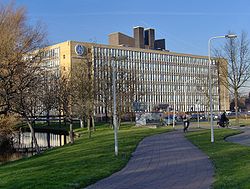 The Pieter de la Court-building, the main building of the Faculty of Social and Behavioral Sciences
The Pieter de la Court-building, the main building of the Faculty of Social and Behavioral Sciences
Some of the notable graduate programs are
- Air and Space Law
- Asian Studies
- Bioinformatics
- Chemistry
- Industrial Ecology M.Sc. (track)
- DNA Computing
- Drug Delivery Technology and Biopharmaceutics
- European Law[29]
- European and International Business Law
- European Union Studies
- Evolutionary and Ecological Sciences
- Functional Genomics
- History
- ICT in Business[30]
- Public International Law
- International Relations and Diplomacy
- International Tax Law[31]
- Islamic Studies
- Life Science and Technology
- Linguistics
- Mathematics
- Media Technology[32]
- Nanoscience
- Philosophy of a Specific Discipline
- Toxicology
Doctorate programs
In addition, most departments, affiliated (research) institutes or faculties offer doctorate programs or positions, leading to the Ph.D degree. Most of the Ph.D. programs offered by the university are concentrated in several research schools or institutes.
Research schools and affiliated institutes
Leiden University has more than 50 research and graduate schools and institutes. Some of them are fully affiliated with one faculty of the university, while others are interfaculty institutes or even interuniversity institutes.
Institute ASC Research Centre for African Studies CML Institute of Environmental Sciences (CML)[33] CNWS Research School of Asian, African, and American Studies CRC Crisis Research Centre[34] CTI Center for Language and Identity E.M. Meijers Institute Research School for Legal Studies eLaw@Leiden Centre for Law in the Information Society Grotius Centre Research Centre for International Legal Studies GSS Leiden Graduate School of Science Historical Institute Research Institute of History Huizinga Instituut Research Institute and Graduate School of Cultural History IBL Research Institute for Biology IIAS International Institute for Asian Studies IOPS Interuniversity Graduate School Psychometrics and Sociometrics ISED Institute for the Study of Educational and Human Development ITC International Tax Center (ITC)[35] LACDR The Leiden Amsterdam Center for Drug Research LCMBS Leiden Centre for Molecular BioScience Leyden Academy Leyden Academy on Vitality and Ageing[36] LGSAS Leiden Graduate School for Archeology LIACS Leiden Institute of Advanced Computer Science LIBC Leiden Institute for Brain and Cognition[37] LIC Leiden Institute of Chemistry LION Leiden Institute of Physics LISOR Leiden Institute for the Study of Religion LUCL Leiden University Centre for Linguistics LUMC Leiden University Medical Centre LUMI Leiden University Mathematical Institute Mediëvistiek Netherlands Research School for Medieval Studies NIG Netherlands Institute of Government NOVA Netherlands Research School for Astronomy N.W. Posthumus Instituut Netherlands Research Institute and School for Economic and Social History OIKOS National Graduate School in Classical Studies Onderzoekschool Kunstgeschiedenis Dutch Postgraduate School for Art History OSL Netherlands Graduate School for Literary Studies PALLAS Research Institute of Art History and Literatures of the Western World Polybios Graduate School for Political Science and International Affairs Sterrewacht Leiden Leiden Astronomical Observatory The Europa Institute Research Institute for Legal Studies in the Field of European Integration Van Vollenhoven Institute Research Institute for Law, Governance and Development Notable alumni and professors
- A
- Piet Aalberse, politician
- Nasr Hamid Abu Zayd, theologian
- John Quincy Adams, 6th President of the United States of America
- Princess Aimée of Orange-Nassau, van Vollenhoven-Söhngen, royalty
- Nebahat Albayrak, politician
- Johannes Alberti, theologian
- Bernhard Siegfried Albinus, anatomist
- Alexander, Prince of Orange, royalty
- Princess Anita of Orange-Nassau, van Vollenhoven-van Eijk, royalty
- Ayaan Hirsi Ali, activist
- Jacobus Arminius, theologian
- Tobias Asser, Nobel laureate (Peace 1911)
- B
- Caspar Barlaeus, theologian
- Queen Beatrix of the Netherlands, Queen of the Netherlands
- Charles Ruijs de Beerenbrouck, Prime Minister of the Netherlands 1918-25, 1929–33
- Coenraad van Beuningen, diplomat
- Kune Biezeveld, theologian
- Nicolaas Bloembergen, Nobel laureate (Physics 1981)
- Herman Boerhaave, physician
- Bart Bok, astronomer
- Frits Bolkestein, Deputy Prime Minister of the Netherlands 2005-6
- Gerardus Johannes Petrus Josephus Bolland, philosopher
- Ben Bot, politician
- Alexander Boswell, judge
- Rolf Bremmer, academic
- Laurens Jan Brinkhorst, politician
- Thomas Browne, writer
- Sebald Justinus Brugmans, botanist
- Armin van Buuren, musician
- Ian Buruma, writer
- Kofi Abrefa Busia, Prime Minister of Ghana 1969-72
- John Stuart, 3rd Earl of Bute, Prime Minister of the United Kingdom 1762-63
- Paulus Buys, Grand Pensionary of Holland 1572-84
- C
- Archibald Cameron, Jacobite physician
- Hendrik Casimir, physicist
- Carolus Clusius, botanist
- Job Cohen, politician
- Prince Constantijn of the Netherlands, royalty
- Jan Kappeyne van de Coppello, Prime Minister of the Netherlands 1877-79
- Pieter de la Court, economist
- Ludolph van Ceulen, mathematician
- Jodocus Crull, miscellaneous writer
- Petrus Cunaeus, academic
- D
- René Descartes, philosopher
- Nicolaas Diederichs, President of South Africa 1975-78
- Edsger W. Dijkstra, computer scientist
- Volkert Doeksen, CEO of AlpInvest Partners
- Ana Dolidze, lawyer
- Adriaen van der Donck, lawyer
- Janus Dousa, statesman
- Johannes van den Driesche, theologian
- Thomas von der Dunk, historian
- E
- Paul Ehrenfest, physicist
- Willem Einthoven, Nobel laureate (Medicine 1924)
- Albert Einstein, Nobel laureate (Physics 1921)
- Simon Episcopius, theologian
- Paul Sophus Epstein, physicist
- Thomas van Erpe, orientalist
- F
- Enrico Fermi, Nobel laureate (Physics 1938)
- Henry Fielding, English novelist
- Paul Fleming, German poet
- Prince Floris of Orange-Nassau, van Vollenhoven, royalty
- John Lauder, Lord Fountainhall, jurist
- Prince Frederick of the Netherlands, royalty
- G
- Thomas Girdlestone, physician
- Michiel Jan de Goeje, orientalist
- Franciscus Gomarus, theologian
- Johann Georg Graevius, academic
- Jacobus Gronovius, academic
- Hugo Grotius, jurist
- Lemuel Gulliver, protagonist of 'Gulliver's Travels'
- H
- Geertruida de Haas-Lorentz, physicist
- Melanie Schultz van Haegen, politician
- Sri Sultan Hamengkubuwono IX, Vice President of Indonesia 1973-78
- Jan Hamer, chemist
- Mohammad Hatta, Prime Minister of Indonesia 1948-50
- David Hartley (the Younger), politician
- Erik Hazelhoff Roelfzema, RAF pilot and Dutch spy
- Daniel Heinsius, scholar
- Touraj Atabaki, academic
- Tiberius Hemsterhuis, philologist
- Paul Hermann, botanist and physician
- Gerrit Jan van Heuven Goedhart, Nobel laureate (Peace 1954)
- Jacobus Henricus van 't Hoff, Nobel laureate (Chemistry 1901)
- Gijsbert Karel van Hogendorp, Prime Minister of the Netherlands 1813-14
- Jaap de Hoop Scheffer, 11th Secretary-General of NATO
- Johannes Hudde, politician and mathematician
- Johan Huizinga, historian
- Christiaan Huygens, mathematician and physicist
- Constantijn Huygens, Jr., statesman
- J
- Maarten Jansen, academic
- Queen Juliana of the Netherlands, royalty
- K
- Heike Kamerlingh Onnes, Nobel laureate (Physics 1913)
- Egbert van Kampen, mathematician
- Johan Hendrik Caspar Kern, linguist
- Pieter Kooijmans, judge of the International Court of Justice
- Ton Koopman, conductor
- Tjalling Charles Koopmans, Nobel laureate (Economics 1975)
- Hendrik Anthony Kramers, physicist
- Abraham Kuijper, Prime Minister of the Netherlands 1901-05
- L
- Lousewies van der Laan, politician
- Jona Lendering, historian
- Hendrik Lenstra, mathematician
- Justus Lipsius, philologist and humanist
- Hendrik Antoon Lorentz, Nobel laureate (Physics 1902)
- Joseph Luns, 5th Secretary-General of NATO
- M
- Peter Mair, political scientist
- Princess Margriet of the Netherlands, royalty
- Eric Mazur, physicist
- Richard Mead, physician
- Victor Muller, CEO of the car companies Spyker Cars and Saab Automobile AB
- Pieter van Musschenbroek, scientist
- N
- William Frederick, Prince of Nassau-Dietz, royalty
- O
- Jan Hendrik Oort, astronomer
- Ivo Opstelten, politician
- P
- Peter Simon Pallas, zoologist
- Thomas Parker, Puritan minister and scholar
- Perizonius, scholar
- Nicolaas Gerard Pierson, Prime Minister of the Netherlands 1897-1901
- Theodoor Gautier Thomas Pigeaud, academic
- Archibald Pitcairne, physician
- Ronald Plasterk, scientist and politician
- Prijono, politician
- R
- Hans Ras, academic
- Caspar Georg Carl Reinwardt, botanist
- Rembrandt van Rijn, painter
- Caspar Reuvens, archaeologist
- John Robinson, pastor of the Pilgrim Fathers
- Wil Roebroeks, archaeologist
- David Ruhnken, scholar
- Mark Rutte, Prime Minister of the Netherlands
- S
- Martinus Theunis Steyn, South African lawyer, statesman, sixth president of the Orange Free State
- Joseph Justus Scaliger, theologian and scholar
- Henry G. Schermers, jurist
- Edith Schippers, politician
- Rutger Jan Schimmelpenninck, Grand Pensionary of Holland 1805-6
- Gerard Schouw, politician
- William Sherard, botanist
- Boudewijn Sirks, academic
- Willem de Sitter, physicist
- Jan Six, politician
- Willebrord Snell, astronomer
- Rudolph Snellius, mathmatician and linguist
- Christiaan Snouck Hurgronje, orientalist
- Achmad Soebardjo, diplomat
- Soenario, politician
- Soetan Sjahrir, Prime Minister of Indonesia 1945-7
- Myles Standish, military leader
- Jan Steen, painter
- Pieter Steyn, Grand Pensionary of Holland 1749-72
- Max van der Stoel, politician
- Bram van der Stok, aviator
- Dirk Jan Struik, mathematician
- Franciscus Sylvius, physician and scientist
- T
- Morris Tabaksblat, former CEO of Unilever
- Igor Tamm, Nobel laureate (Physics 1958)
- Johan Rudolf Thorbecke, Prime Minister of the Netherlands 1971-72
- Jan Tinbergen, Nobel laureate (Economics 1969)
- Nikolaas Tinbergen, Nobel laureate (Medicine 1973)
- Christa Tobler
- Nicolaes Tulp, surgeon and politician
- U
- Christianus Cornelius Uhlenbeck, linguist and anthropologist
- V
- Ronald Venetiaan, 6th and 8th President of Suriname
- Maxime Verhagen, Deputy Prime Minister of the Netherlands
- Paul Verhoeven, film Director
- Gerard Verschuuren, geneticist
- Gisbertus Voetius, theologian
- Cornelis van Vollenhoven, academic
- Pieter van Vollenhoven, royalty
- Gerhard Johann Vossius, theologian
- Gijs de Vries, poltician
- Jouke de Vries, academic
- W
- Johannes Diderik van der Waals, Nobel laureate (Physics 1910)
- Wilhelmina, Queen of the Netherlands 1890-1948
- John Wilkes, politician
- William I, Prince of Orange, royalty
- Willem-Alexander, Prince of Orange, heir to the Dutch throne
- Hendrik de Wit, botanist
- Johan de Witt, Grand Pensionary of Holland 1653-72
- Z
- Pieter Zeeman, Nobel laureate (Physics 1902)
- Tim de Zeeuw, astronomer
- Petrus Josephus Zoetmulder, academic
International acclaim
In the 2009 THE–QS World University Rankings list the University of Leiden was ranked inside the top 100 for the fourth consecutive year. However, in 2010 it dropped 22 places in the QS World University Rankings[38] to 82nd from its position of 60th in the 2009 THE-QS Rankings (in 2010 Times Higher Education World University Rankings and QS World University Rankings parted ways to produce separate rankings). In the Academic Ranking of World Universities compiled by Shanghai Jiaotong University Leiden has been in the top hundred universities worldwide since the tables inception in 2003 and in 2010 was ranked 70th overall. The University is associated with at least fourteen recipients of the Nobel Prize
An overview of the THE-QS Rankings up to 2009:
Year Rank (Change) 2005 138 2006 90 (  48)
48)2007 84 (  6)
6)2008 64 (  20)
20)2009 60 (  4)
4)An overview of the Academic Ranking of World Universities up to 2011:
Year Rank (Change) 2003 78 2004 63 (  15)
15)2005 63 2006 72 (  9)
9)2007 71 (  1)
1)2008 76 (  5)
5)2009 72 (  4)
4)2010 70 (  2)
2)2011 65 (  5)
5)See also
- Leiden University College The Hague
- List of early modern universities in Europe
References
- ^ Technically the University of Leuven, currently in Belgium but in the year of its foundation (1425) located in the Netherlands, is the oldest university ever founded in the Netherlands, but Leuven is no longer part of the Netherlands.
- ^ Windows Media file of Queen Beatrix receiving degree, February 2005.
- ^ ARWU 2010 Top 100 Universities.
- ^ QS World University Rankings 2009 - Arts and Humanities
- ^ THE 2009 Top 200 World Universities
- ^ http://www.topuniversities.com/university-rankings/world-university-rankings/2011?page=1
- ^ a b Willem Otterspeer: Het bolwerk van de vrijheid : de Leidse universiteit, 1575-1672. Amsterdam : Uitgeverij Bert Bakker, 2000. ISBN 90-351-2240-2
- ^ Leiden's Nobel Laureates
- ^ BBC NEWS | Europe | Student unearths Einstein paper.
- ^ Talen en culturen van Afrika
- ^ NIEUW: Homepage TCMO
- ^ Home Page Opl. Biologie (Nederlands)
- ^ Startpagina QCMS 3.0
- ^ Talen en culturen van China
- ^ Egyptische Taal & Cultuur
- ^ Engelse taal en cultuur
- ^ Homepage Opleiding Franse taal en cultuur
- ^ Duitse taal en cultuur.
- ^ History
- ^ Hebreeuws en Aramees
- ^ Talen en culturen van Indiaans Amerika.
- ^ http://www.tczca.leidenuniv.nl/
- ^ Opleiding Indonesisch
- ^ Startpagina
- ^ Japanse taal en cultuur
- ^ Talen en culturen van Korea
- ^ Homepage Opleiding Talen en culturen van Latijns Amerika / Spaans
- ^ Nieuw-Perzische Taal en Cultuur
- ^ [1]
- ^ ICT in Business Programme
- ^ Master of Advanced Studies in International Tax Law
- ^ Media Technology MSc Programme
- ^ CML
- ^ [2]
- ^ ITC
- ^ [3]
- ^ [4]
- ^ "QS World University Rankings 2010 Results". http://www.topuniversities.com/university-rankings/world-university-rankings/2010/results.
External links
- Homepage of Leiden University (in English)
- Homepage of Leiden University (in Dutch)
- Graduate Programs in English
- Appleton's Cyclopaedia of American Biography
Amsterdam • Amsterdam VU • Delft Technology • Eindhoven Technology • Groningen • Protestant Theological • Theological University of the Reformed Churches • Leiden • Maastricht • Nijmegen Radboud • Nyenrode Business • Open • Erasmus University Rotterdam • Tilburg • Twente • Utrecht • University for Humanistics • Wageningen
League of European Research Universities Amsterdam · Barcelona · Cambridge · Edinburgh · Freiburg · Geneva · Heidelberg · Helsinki · Imperial College · Karolinska · Leiden · Leuven · Lund · Milan · LMU Munich · Oxford · Paris VI · Paris XI · Strasbourg · University College London · Utrecht · Zürich
Europaeum Bologna · Bonn · HEI Geneva · Helsinki · Kraków (Jagiellonian) · Leiden · Madrid (Complutense) · Oxford · Paris I: Panthéon-Sorbonne · Prague
Coimbra Group of European research universities Aarhus · Barcelona · Bergen · Bologna · Bristol · Budapest · Cambridge · Coimbra · Dublin · Edinburgh · Galway · Geneva · Göttingen · Granada · Graz · Groningen · Heidelberg · Iaşi · Istanbul · Jena · Kraków · Leiden · Leuven · Louvain-la-Neuve · Lyon · Montpellier · Oxford · Padua · Pavia · Poitiers · Prague · St. Petersburg · Salamanca · Siena · Tartu · Thessaloniki · Turku I · Turku II · Uppsala · Würzburg
Coordinates: 52°09′22″N 4°29′13″E / 52.156071°N 4.486949°E
Categories:- Leiden University
- Universities in the Netherlands
- Buildings and structures in Leiden
- Coimbra Group
- Educational institutions established in the 1570s
- 1575 establishments
Wikimedia Foundation. 2010.

